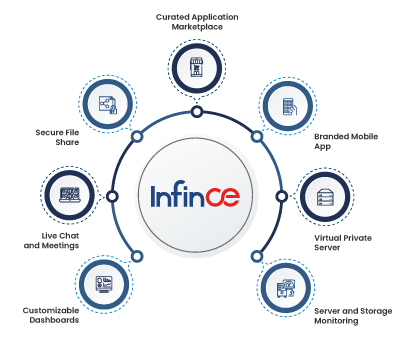Managing a Remote Team Successfully During COVID-19
The remote work culture has become more than a trend today and evolved into the mainstream practice for many companies across the world. While remote working does have many advantages, it comes with quite a few challenges, especially when you have to start managing a completely remote team all of a sudden.
Read more: Best Practices to Remotely Manage Your Business During COVID-19
To effectively navigate the challenges of remote team management, you need to be aware of the significant factors that can affect job performance and level of engagement. You also need to prepare a robust strategy to ensure that everyone in your team delivers their best capability along those lines. This post covers a few tips to manage remote teams efficiently and drive success for your organization.
1. Get the right project management software
This is the most critical aspect of managing a remote team. When working across different time zones, you need to invest in a reliable digital workplace orchestration platform with excellent online communication and work management features. This will help to add more value to your remote working culture while ensuring that you have the right tools to plan tasks, manage projects, track employee performance, and do much more, all under one roof.
Read more: 5 Ways A Project Management Tool Can Help Your Business Grow
2. Schedule every day check-ins
Daily check-ins may seem tricky in a work from home scenario, but it is a vital ingredient for managers and teams new to remote work culture. An email, call, or text message is enough to check with your team and know how they are doing. However, it would be even more effective to use video conferencing to bridge the gap of face-to-face interaction. You can get all these features in an all-in-one team collaboration software, which makes daily communication so much easier for you.
3. Set your expectations right
Your company will have certain expectations for each of the employees in your team. You need to communicate those expectations clearly to your team and get their feedback on whether they align with the same. It is even more critical to reassign your team members to new tasks. Having clear targets for the work hours, availability, team meetings, and project deadlines will help ensure that everyone delivers their best performance to meet the expectations.
4. (Re)Work on your communication skills
You are going to use an online communication platform for managing your remote team. This means that you need to understand how the team management software works, its features, and how you can use it to bring value to your team. You may be familiar with using some online communication channels, but the stakes are higher when it comes to remote team collaboration. So you need to develop your writing skills and virtual meeting strategies to ensure that your team is on the same page when you work on a project.
Read more: 7 Ways to Improve Team Collaboration in 2021
5. Use video conferencing often
While telephonic and written conversations should be a part of your day-to-day team management regime, it is also necessary that you incorporate video conferencing to build rapport. This way, you can assess the body language of your employees and see how they react to a change in plans or a new assignment. It will also help you identify some non-verbal clues that indicate if something is wrong with your team members. That will, in turn, allow you to address the situation proactively before it becomes a significant problem.
Read more: 5 Workplace Innovations You Can Welcome with Video Conferencing
6. Have regular team meetings
Apart from daily check-ins, you should also schedule regular team meetings to discuss the current project and its status. It will help you assess the progress of the job at hand to meet the deadlines as expected. Moreover, regular team meetings can help brainstorm different ideas for new projects while imparting a sense of involvement to everyone in your team. You can also ensure that everyone is up-to-date and works towards realizing the company’s common goal.
7. Focus on the outcomes
It is imperative to focus on the result rather than the process to ensure the optimal engagement of your team members. At the same time, you should also evaluate the process constantly and find ways to improve it to drive better efficiency from your employees. Therefore, you need to define the goals upfront and focus on reaching the target by letting your team members develop the plan of action they feel more comfortable with and execute well.
Download White Paper: Adapting to The Changing Face of Enterprise Collaboration
8. Provide help whenever needed
To build a successful remote team, you should be able to address the requirements of all your employees whenever needed. For instance, if your team comes across an unexpected problem related to the project at hand, you should be there to clarify whatever doubts they have to minimize downtime. Here too, video calls can help you identify if your team members feel low or unmotivated to complete a task. At that point, you can pitch in and give them a helping hand to finish the job as required.
9. Encourage social interactions
Social isolation is a significant challenge in remote working. Therefore, you need to build a remote work culture that integrates informal social interactions in a traditional office setting into your online communications. From virtual weekend meet-ups to after-office casual talks, encouraging social interactions within your team will boost employee morale and engagement. You can even plan virtual pizza parties, happy hours, or employee recognition sessions for non-work-related conversations.
Read more: 5 Best Practices To Enable Seamless Communication For Your Remote Workforce
10. Mentor more, manage well
The best remote team managers prefer to be mentors who guide their teams on different aspects of their job roles rather than “managing” them. Leading by example always works, be it in a traditional office scenario or remote work culture. Make sure that you are more of a mentor and coach to your team. It may require taking new initiatives to address the challenges your team is facing, but it will be worth the effort to develop a successful remote workforce.
These are a few ways, which will help you ensure effective remote team management. As every industry is going global and digital, it is high time to adopt the right approaches and tools that make your team more efficient and gain a competitive advantage in the market.InfinCE is a digital workplace orchestration platform that allows businesses to manage their employees, projects, and operations seamlessly in a remote-first world. Request a demo to see InfinCE in action.





